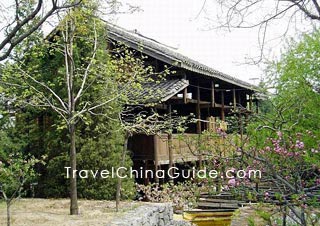Dong Nationality
The Dong ethnic minority lives primarily in the border regions between Guizhou, Hunan and Hubei Provinces, and it was during the Tang Dynasty (618-907), that this minority separated from the mixed minority 'Bai Yue', naming themselves Dong. Now their population is 2,960,293. Their language is a branch of Zhuang-Dong Group of the Sino-Tibetan phylum though many of them also speak Chinese.
![]() Economy and Crafts:
Economy and Crafts:
They work on agriculture, forestry and the industrial arts. The women are adept at spinning and embroidering and on the brocade; they like to embroider patterns of animals, plants, wares, and even legends. Most of their clothes are self made in color of blue, black, white and purple. They are also skilled in the arts of painting, engraving and the casting of ornate silver work.
![]() Religion:
Religion:
Their beliefs remain original, believing all things have spirits and gods - of land, water, ox, and the spirit of ancestors, etc. Every time there is natural disaster or disease, the Dong people will think devils are responsible and ask a wizard to ward them off.
![]() Food:
Food:
The staple food of the Dong ethnic minority is rice, millet, corn, wheat sorghum and glutinous rice. Oil tea is their favorite drink, which can also be their breakfast, whose ingredients include peanuts, sesame, soybean, tea leaves, and so on. A custom related to it is that, a guest is usually treated to a bowl of oil tea and a single chopstick; when he finishes drinking and does not return the chopstick, hosts will consider the bowl is not enough and replenish the bowl. Dong people also like pickled and acidic foods.

Residential House of Dong Nationality ![]() Architecture:
Architecture:
They must be very proud of their artistic contribution to architecture. Wind and Rain Bridge, and Drum Tower , are well renowned for the elaborate structural design.
![]() Festivals:
Festivals:
Like the Han, the Dong has New Year's Day, Mid Autumn Day, and Dragon Boat Festivals along with their own, unique festivals:
Dongnian Festival - on the first day of the eleventh lunar month people will celebrate for a harvest. They make Ziba (cooked glutinous rice pounded into paste), chicken, and pickled carps.
New Rice Tasting Festival - when the early rice is ripe, all the families pick and cook some, and worship ancestors after which, wonderful bullfighting activities will take place.
Sisters Festival - on the eighth day of the fourth lunar month, married women must return their parents' family and enjoy a merry time with their sisters. Together, they make Ziba and will take some to their husbands' family.![]() More Ethnic Groups in Guizhou and Hunan Area:
More Ethnic Groups in Guizhou and Hunan Area:
Miao Yi Bai Bouyei Tujia Yao